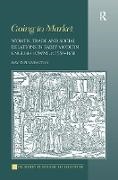Description
Product details
| Authors | David Pennington, Pennington David |
| Publisher | Taylor and Francis |
| Languages | English |
| Product format | Paperback / Softback |
| Released | 14.10.2024 |
| EAN | 9781032927596 |
| ISBN | 978-1-032-92759-6 |
| No. of pages | 208 |
| Weight | 380 g |
| Subjects |
Humanities, art, music
> History
> General, dictionaries
History, European History, BUSINESS & ECONOMICS / Industries / General, HISTORY / Europe / General, BUSINESS & ECONOMICS / Economic History, HISTORY / World, HISTORY / Social History, Social & cultural history, SOCIAL SCIENCE / Archaeology, General & world history, Economic history, c 1500 onwards to present day, Archaeology, 17th century, c 1600 to c 1699, Social and cultural history, Early modern history: c 1450/1500 to c 1700, General and world history, History and Archaeology, C 1600 To C 1700, Modern Period, C 1500 Onwards, Industrialisation & Industrial History, Industrialisation and industrial history |
Customer reviews
No reviews have been written for this item yet. Write the first review and be helpful to other users when they decide on a purchase.
Write a review
Thumbs up or thumbs down? Write your own review.

